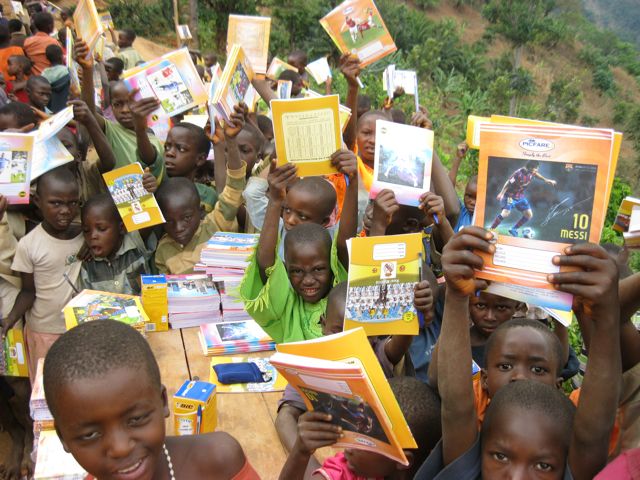On many occasions since my GHC fellowship began, I’ve thought: my job is awesome. The chance to work with an organization that truly engages the community is a privilege, and I’m learning so much from my GHC and Burundian colleagues as well as the children, teachers and parents with whom I work to improve primary school education quality and access in our area.
No day is typical, but I’ll share an example from a few Saturdays ago. Joined by two members of our education team and another GHC fellow, I hiked to a small mountain village that’s not accessible by road and distributed notebooks to several hundred vulnerable primary school children who need notebooks to stay in school. When we arrived, the children were visibly excited, most peering out of classroom window, giggling and talking about our arrival and smiling from ear-to-ear. Education is free but parents are supposed to buy their children notebooks for the year. If they show up to school without notebooks, they’re “chased” home by their teachers or the principal. Sometimes children return a day or two later with notebooks, but other times they don’t return for a week or at all. Delivering notebooks to enthusiastic children who need them to continue school is humbling and a privilege.
At these notebook distributions, there’s a lot of hope and excitement, and most children are keen to succeed in school. They talk to us about the problems they face, we listen, and they commit to doing their homework, attending class, respecting their parents and teachers and generally doing their best in school. At each event, a member of our education team gives a pep talk about the importance of education and the roles and responsibilities of all actors (principals, teachers, government, students, parents, etc.). We work with parents, teachers, principals and students to identify ways they can do more to improve education, insisting that change isn’t possible unless each person does more.

At the insistence of my colleagues, I often speak as well, in French, which is subsequently translated into Kirundi. I’m always uncomfortable at what I consider undue attention because I’m white, always conscience of the legacy of colonialism and arrogance of many who came believing they could help but made matters worse, as well as all of the added expectations that accompanies that whiteness. But my colleagues say it is inspiring to hear a message of hope from the muzungo from “America” who traveled from so far away, and I trust their judgment and comply. There are many challenges in rural Burundi, but the smiles and zeal of the children and new commitments from parents, teachers or principals to do more to improve education in this area continues to inspire me. Getting to hike in beautiful mountains with a stunning view of Lake Tanganyika isn’t too bad either.

